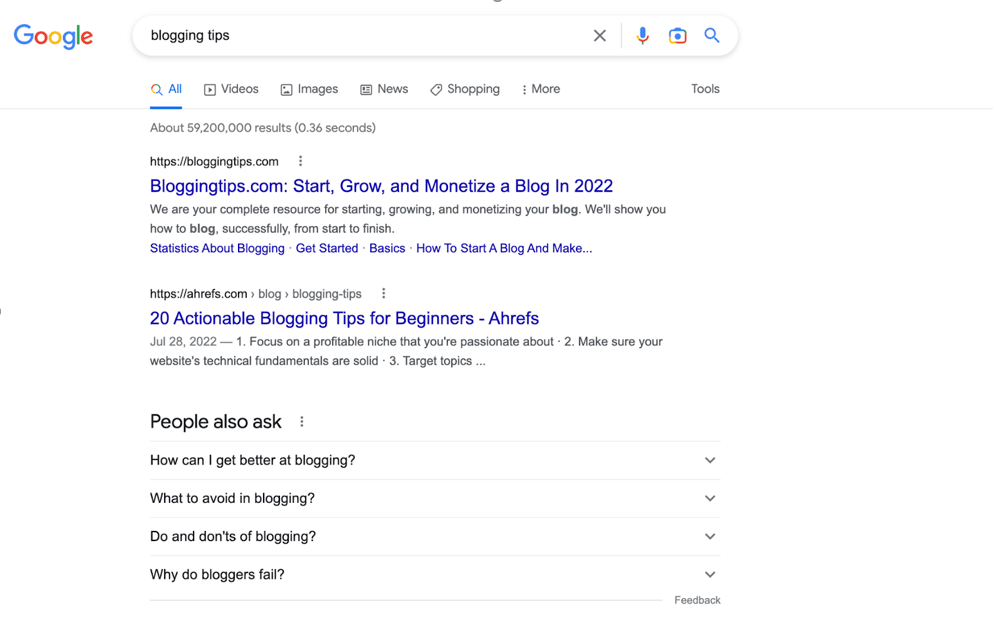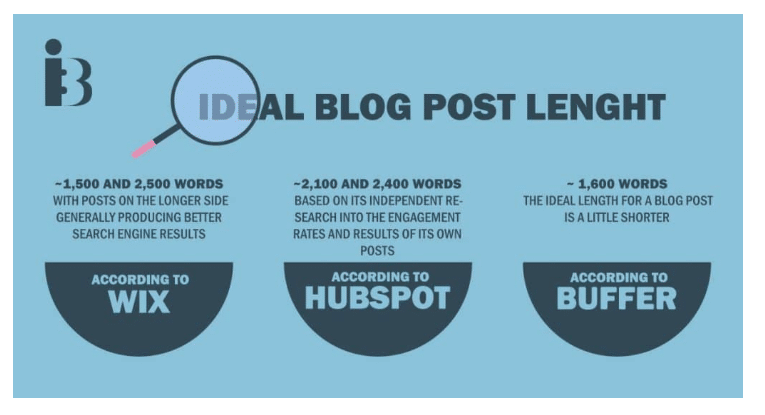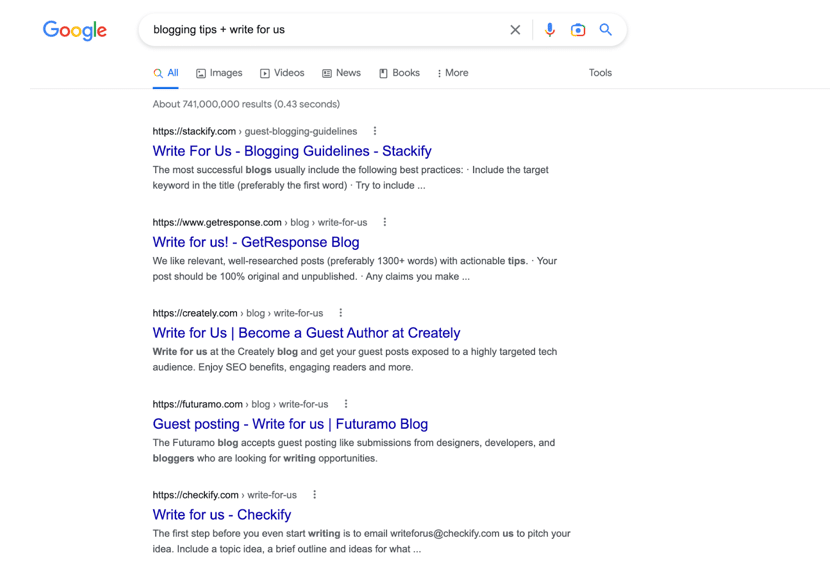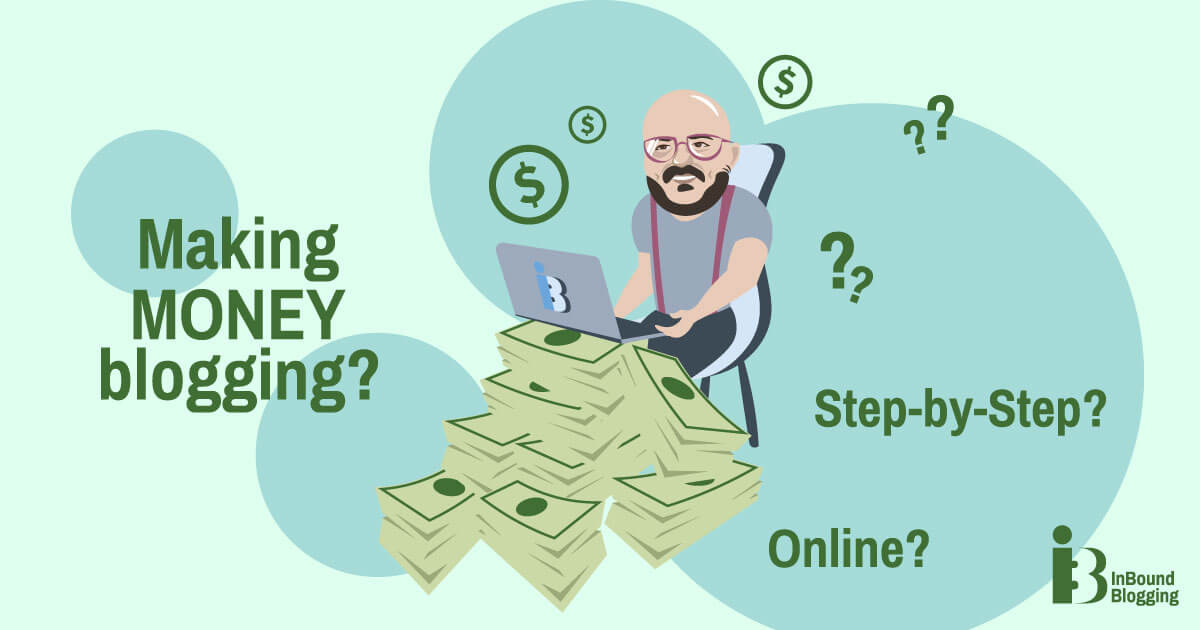Playback speed:
Starting a blog is not easy, especially if you are new to this industry.
However when done right, blogging can be extremely rewarding. For many, it can become a full-time job and a lucrative source of income.
Every blogging path is unique and comes with its own perks and obstacles. It’s safe to say there’s no one-size-fits-all approach that covers everything you need to know to become a successful blogger.
However, there are definitely some fundamental blogging tips that can shed light on this process and make you feel less overwhelmed when starting your blog.
This article covers more than 20 practical tips that will come in handy for anyone looking to jumpstart their blog.
These blogging tips are derived from my experience of more than 10 years as a digital marketer, SEO manager and blogging consultant.
The Most Crucial Blogging Tip: Niche down
First and foremost, you should start your blogging journey by choosing a profitable and popular niche that you’re interested in.
There are more than 600 million blogs globally, so you need to have some tricks up your sleeve to stand out from the crowd, and niching down is the ticket to get you there.
Focusing on a blog niche is what differentiates an excellent blogger from a mediocre one.
Picking a niche will allow you to become an expert on the topic, and will help you attract and grow a loyal audience.
It’s also important to choose a niche that you have a genuine interest in, otherwise, you won’t be motivated enough to produce high-quality blog content.
If you’re really passionate about the topic you write about, you’ll find writing more enjoyable, and your readers will sense your authenticity through your words.
Write about topics people are searching for
Choosing a niche, although crucial, is not enough to build and grow a blog that readers will come back to.
You may have a genuine passion for a certain subject, but if it’s too specific or obscure, there may not be a broad enough audience to make it worth your effort.
Do your research and type your niche into Google. See if there are enough results for that topic, and the types of pages currently ranking.
If you determine that your topic is something very few people are searching for, then it might be best to rethink your options.

Keep an eye on search intent
Now that you’ve established your niche, it’s important to keep in mind Google’s main goal – to provide users with the most relevant content.
At the end of the day, having a successful blog is intrinsically linked to Google’s criteria that help your articles rank high in search intents.
So if you want to rank high in Google and get passive organic traffic to your new blog, you need to create relevant content that aligns with search intents.
To do that, analyze the top results Google showcases for the niche you’ve chosen, and get inspiration from there.
You can also use an SEO tool like Ahrefs or Semrush to ascertain which keywords to target. Ideally, you want keywords that have a high traffic potential and a low keyword difficulty.
Monitor post length
Despite our ever-shortening attention spans, research shows that when it comes to blogging, lengthy articles are preferred.
Although there is no one-size-fits-all approach for determining the ideal blog post length, industry giants like Buffer and Hubspot recommend blog articles be at least 1,600 words and up to 2,400 words.
These conclusions are logical since short-form content has a lower chance of ranking high in search results.
Lengthy content, on the other hand, goes in-depth, giving you the possibility to outrank your competitors and come up with something new, while also providing the necessary space to optimize for SEO.

Create content worth referencing
Every great piece of content has a common denominator you should be acutely aware of: they’re shareable.
Ideally, every reader who stumbles upon your blog article would share it with at least a friend, creating a buzz around it.
The golden question; how can you ensure that your piece of content is worth sharing?
- It is unique. Although you’re talking about a subject that others have likely already talked about, try to address it from your unique perspective. If you have hands-on experience with the subject, even better.
- It contains data. Sure, personal experience is great, but insights based on data will make you stand out.
- It cites experts. If you have access to industry experts, try to interview, cite or quote them in your article. This will increase your chances of getting noticed by a larger audience.
Craft amazing headlines
Your blog post’s headline is usually the first thing people notice. As a result, it must be compelling enough to capture their interest and entice them to read the entire piece.
Always brainstorm loads of ideas for your website titles. The reality is the first ones you come up with may not necessarily be the best.
To help you generate clickable blog post headlines, you can also utilize a free tool like Coschedule.
This tool grades your title and provides suggestions on how to enhance it.
Write a good introduction
A snappy introduction is what will make the audience read your article from start to finish.
To make sure you capture your reader’s attention, clearly expose the problem you’re tackling in your article. Then, explain how you’ll solve the problem.
If you want to go in-depth, it’s a good idea to provide a little bit of context about the issue. If you have some powerful statistics to hand, throw them in the intro.
Be honest and straightforward, and tell your reader what to expect from the article.
Get feedback on your writing
If you have the resources to hire an editor to review your writing, do that. If you don’t, you can always ask a friend or a more experienced content writer to give you some feedback.
Someone who reads your content for the first time can identify areas that need improvement, sentences that need to be reworded, or even small blogging mistakes that are easy to miss.
Another useful tip is to survey your readers and ask them what they think about your blog.
This way, you’ll make sure you deliver the content that your audience is most interested in.
Write consistently
There is no alternative to dedication and perseverance.
Unfortunately, there are no shortcuts to consistency. If you want your blog to grow, you must post and publish on a regular basis.
It’s up to you to decide the frequency of your blog posting. Is it weekly or is it monthly?
After you’ve decided how frequently you’ll publish, try to stick to that schedule.
Otherwise, your readers will be disappointed and your chances of procrastinating writing will surely increase.
Make your posts easy to read
Let’s face it, many people would rather scroll on social media or watch a show on Netflix than read a blog post.
Your job as a blogger is to persuade your audience to read your content.
Luckily, there are a couple of blogging tips and tricks that can help you transform your user experience:
- Use brief paragraphs. Long paragraphs intimidate readers, whereas short ones entice them. Check and improve your writing with Hemingway or Grammarly.
- Break up long sentences. It is difficult to follow longer phrases, so try to keep them short and sweet.
- Make use of visuals. Videos, photos, GIFs, infographics, quotes – you name it. Visuals can help emphasize your points without getting overly wordy.
- Get the most from formatting. Break up long sections of material and highlight key points by using bold, italics, quotations and lists.
Update older content
Another blogging tip you should keep in your toolbox is updating your older content.
As you become proficient in writing, you’ll notice that your style, knowledge and opinions evolve and mature.
Refreshing your older content with newfound knowledge and ideas will be greatly appreciated by your audience.
Plus, updating old content is also excellent for SEO. Google prefers up-to-date content, so rewriting your older pieces will help you improve your ranking and generate more search traffic.
Refreshing older content doesn’t mean you have to rewrite the entire piece from scratch.
Sometimes, it’s enough to update your images, add more keywords or adjust your table of contents.
Reach out to people you admire
A good blogging tip for new bloggers is to reach out to people you admire.
If you mention an industry expert or influencer in one of your blog posts, it’s always advisable to let them know after you’ve published your piece.
Most of the time, they’ll be happy to hear they’ve been featured, and might even share your article on their social media profiles.
This not only gets you more traffic but also opens the door for potential collaboration in the future.
Another approach is to reach out to bloggers you admire.
Most bloggers enjoy assisting other bloggers, if you’re lucky they may share your latest post with their audience or become loyal readers themselves.
You can learn from other bloggers and improve your own site by establishing a relationship with them.
Engage in a conversation with other bloggers on social media!
Tackle your competitors’ best-performing topics
Tackling your competitors is essential if you want to become a successful blogger. This research will uncover plenty of insights you can use to outperform them.
Start by identifying who your top-performing competitors are. Then, take a look at their blog design, the type of content they create, their social media presence and other factors.
Next, use an SEO tool like Semrush or Ahrefs to get more insights, such as their best-performing topics, the keywords they rank for, the structure of their URLs, etc.
This analysis will tell you the topics their target audience is most interested in. Since you have a comparable readership, these topics will be of interest to your readers as well.
Examining what your competitors are writing about is an excellent tool for generating blog post ideas for your own blog.
Once you know what your competitors are up to, do the same thing they are doing – only better!
Write guest posts for other blogs
A fantastic strategy to promote your blog is to guest blog on other sites.
You get to introduce yourself to the readers of another site, and if they enjoy your guest post, they’ll probably visit your blog as well.
Keep in mind that you should only post to high-quality, relevant sites.
Do proper research and identify publications that accept guest posts in your niche and that have a high domain ranking.
Before contacting the publication, ensure you’ve read the guest blogging guidelines.
By adhering to their guidelines and writing a personal email introduction you’ll increase your chances of being accepted to write for them.

Establish a social media presence
If you want to build a successful online business, you must build and maintain a social media presence.
Promoting your blog posts on social media is not only free but is extremely easy and can benefit you long-term.
Almost everyone is on social media nowadays, therefore you can reach a large number of new readers there.
You can also keep an eye on your competitors on social media, get inspiration from other companies and content creators you admire, and even grow your own online community over time.
It’s advisable to create social media profiles for your blog instead of utilizing your own personal accounts. This will give you more credibility and allow you to establish yourself as an authority.
Developing a strong social media presence will also assist you in building relationships with existing clients, strengthening their loyalty and increasing online traffic.
Build an email list
A high-quality blog means nothing without its readers.
Therefore, you need to build an email list to make sure you can keep your readers close and communicate with them frequently.
Start by choosing an email marketing service, like Sendinblue or SendGrid. Then, think of different incentives to encourage your readers to subscribe.
Address this process wisely. Remember that people want value, so if you want your readers to subscribe to you, give them something in return.
The value you offer your readers can be anything, from a free subscription, discounts on your services, a free eBook or the PDF version of your article.
Once you have a list, communicate with your readers to build a relationship.
You can promote your products or services, drive traffic to your newest blog articles, or even survey your audience to help you generate even better content.
Regardless of what your objectives are, building an email list is non-negotiable.
Promote your content in online blogging communities
If you want to reach a large audience, promoting your blog on your social media profiles and in your newsletters is sometimes not enough.
Joining online communities should be one of your social media goals. This ensures that your brand reaches your target audience.
Facebook and LinkedIn have plenty of online communities, where people from all around the world promote their content, exchange ideas and ask for advice.
After you’ve done your research and selected the online groups best suited to your niche, be sure to read and adhere to the set of rules in order to keep your membership.
Next, be an active member of the community in addition to sharing your work. This includes responding to inquiries, reacting to other people’s blog posts and offering credit or criticism where appropriate.
All these steps will ensure the group admins accept your content promotion posts.
You also need to get creative when promoting your blog. Try to repurpose your content into different formats so it doesn’t come off as overly promotional.
For example, you can turn a list from your blog article into a nice carousel or even make a short video in Canva about it.
Do basic on-page SEO
If you’re into blogging, you should know by now that good content can’t exist without SEO.
While off-page SEO is harder to control, on-page SEO is completely within your control.
Google uses the E.E.A.T. (Experience, Expertise, Authoritativeness and Trustworthiness) principle to rate the effectiveness and quality of content.
We’ve already talked about search intent, which falls under Google’s E.A.T. principle, but you have to do more if you want your content to rank high in search engines.
After you’ve identified the kind of content people are searching for, do some keyword research. This is the process of determining which words or phrases people use to search for information related to your topic.
Then, ensure you link to authoritative external sources. This will give you more credibility in the eyes of your readers and Google.
Don’t forget about interlinking, which is another essential aspect of on-page SEO. Interlinking is crucial because this assists Google in better understanding and ranking your website.
By providing Google with links to follow as well as informative anchor text, you can tell Google which pages on your site are important and what they are about.
Write custom meta descriptions for blog posts
Another important aspect of on-page SEO is writing custom meta descriptions and titles for your blog articles.
A meta description (also known as a meta description property or tag) is an HTML element that describes and summarizes the contents of your website for users and search engines.
Improving your meta description, as well as your titles, is critical because they can influence readers to click (or not) on your content.
Google employs click-through rate (CTR) to determine whether you are a good result.
If more people click on your result, Google will deem you to be a good result and boost you up the ranks based on your position.
Invest in good web design
Another vital blogging tip for new bloggers is to invest in good web design and create an awesome user experience for your readers.
The best way to achieve this is to hire a web designer to help you create a strong brand identity and a beautiful website that aligns with it.
However, if you can’t afford to hire a professional, don’t worry. There are plenty of resources for beginners to help you craft a great website.
First, decide on what your brand should be. This will dictate the overall look of your website, including colors, fonts, images, and so on.
Then, do thorough research on your competitors’ websites and get inspiration from there.
Once you’ve settled on the fundamentals, you can opt for a free WordPress blog theme to give your blog a professional look with simple features.
Use infographics
In today’s competitive world, many blogs fall short when it comes to actually engaging their audience. This is where visual content comes to the rescue.
You don’t have to be a graphic designer to understand how much visual material can boost engagement.
Since our attention spans are getting shorter day by day, it’s critical that you insert visuals throughout your blog articles to keep your readers on your site for longer.
Tools like Canva have default infographic templates that you can use, edit and then add to your content.
Automate your marketing
Lastly, an essential blogging tip for business that will save you considerable time is marketing automation.
This is a powerful solution that will allow you to scale your business by streamlining, automating and monitoring your marketing processes.
There are a lot of free and paid marketing automation tools on the market to choose from, depending on your needs.
You can use an AI to help you generate more content ideas and headlines, or content distribution tools that automatically distribute your content on social media to amplify your reach.
Final thoughts
Building a successful blog requires effort, dedication, persistence and a long-term strategy.
While the above blogging tips are a great starting point, keep in mind that this industry is extremely competitive and constantly changing, so you must remain up-to-date with the latest trends.
It is also vital to remember that every blogger’s journey is unique, so you should go out there, test and see what works best for you.
Lastly, don’t forget to have fun. Remember that you’ve decided to embark on this journey because of your passion for writing, so enjoy the process.
If you enjoyed this article, drop a comment down below and let us know your thoughts, along with your best blogging tips for beginners!
FAQ
Why Is It Important to Choose the Right Blogging Platform?
Choosing the right blogging platform is crucial because it determines the flexibility, customization options, and features available for your blog. Different platforms have their own strengths and weaknesses, so it’s important to choose one that aligns with your blogging goals and technical proficiency.
How Do I Find the Right Niche for My Blog?
Finding the right niche for your blog involves identifying your passions, interests, and areas of expertise. It’s important to pick a niche that you are knowledgeable about and that has a sizeable audience interested in your chosen topic. Researching popular topics and analyzing competition can also help you find a niche that has a good balance of demand and potential for growth.
What Are Some Common Blogging Mistakes Beginners Should Avoid?
Some of the most common blogging mistakes beginners should avoid include not having an editorial calendar, not promoting their blog on social media, not writing actionable and valuable content, not leveraging SEO techniques like using relevant keywords and optimizing meta tags, and not interacting and engaging with their readers.
How Can I Create an Effective Editorial Calendar?
To create an effective publishing calendar, start by brainstorming blog post ideas related to your niche. Afterward, you can organize these ideas into a monthly or weekly schedule, ensuring a consistent flow of new content. It’s also important to allocate enough time for research, writing, editing, and promoting each blog post.
How Can I Monetize My Blog?
There are several ways to monetize your blog, including displaying ads, participating in affiliate marketing programs, creating and selling digital products or courses, offering sponsored content or partnerships, and providing services related to your blog’s niche such as coaching or consulting.
What Are Some Free Blogging Tools and Resources for Beginners?
Blogging doesn’t have to be a costly investment. Some free blogging tools and resources for beginners include platforms like WordPress.com and Blogger, which offer free blog hosting and basic customization options. Canva can be used for creating visually appealing graphics, Google Analytics for tracking your blog’s performance, and Hootsuite for managing and scheduling your social media posts.



